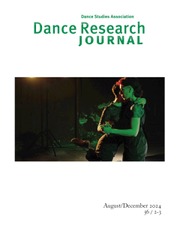Article contents
Slow Scrape (2012–2015)
Published online by Cambridge University Press: 28 April 2016
Extract
How to describe my experience? Some Indigenous peoples have prescribed, specific protocols around introductions, but this is not the case where I'm from. Or, if it was this way in the past, we've lost the knowledge of those introductory protocols. I respect that we should give space to those who have Indigenous ways of introducing themselves. As an Alutiiq woman who lives in a kind of diaspora from my island home of Kodiak in Alaska— and my villages of Port Lions and Afognak—I don't always know how to describe my experience. I am an artist. I live in Canada. I make dance, video, photos, texts.
- Type
- Choreographers' Statements
- Information
- Copyright
- Copyright © Congress on Research in Dance 2016
References
Works Cited
- 2
- Cited by




